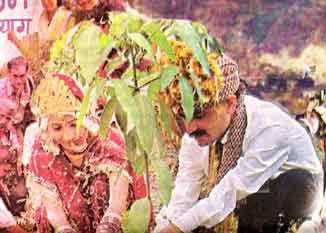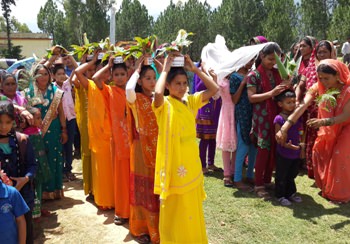The eco-women centric movement has received worldwide recognition including US, UK, Indonesia, Canada, Nepal and Thailand. In India, it spread across 6,000 villages in 18 states.
Another movement by women of Uttarakhand adds a feather in the cap to the cause of women empowerment in the state. Again, the women of Uttarakhand participated in large number to save the environment which is depleting due to global warming.
Maiti is derived from the term ‘mait’ which in Uttarakhand means married woman’s parental

Src: merapahadforum
home. And this movement does not cost any money, but to plant a sapling by a newlywed girl while she leaves her home on the day of marriage. The groom gives some money to bride’s parents for the care of the plant as it is the memory of their daughter. The money received by the groom is not only utilized for the purpose of up-keeping the sapling but is also used for taking care of the needs of underprivileged girls of the village.
The preparation for the event of plantation started once a marriage is fixed. The whole responsibility falls on the shoulder of Maiti didi-s. They are unmarried girls of the village. They decide which plant is suitable for particular weather and soil conditions, make arrangement for that and take proper care of the plant after marriage. If it gets dry and dies they replace it with another plant.
A vision of Kalyan Singh Rawat, now 60-years old, was a teacher then at the Government Inter College. He started this movement in 1995 in Gwaldam hamlet in Chamoli district of Garhwal. This movement is not limited to weddings anymore. It is also noteworthy that post-Kargil War, women of Ochati village developed a Maiti forest in collaboration with the Border Security Force to dedicate it to soldiers. This forest is known as Shaurya Van (Gallantry Forest). Even students of Garhwal University and citizens plant saplings on special occasions. On 50th Independence anniversary of India, each village planted 50 plants in Uttarakhand.
As per Rawat, the movement is called Maiti because ‘Women are more active and energetic than men and are very emotionally connected to their parental home’. This is the biggest afforestation movement in the country after Sundar Lal Bahugana’s Chipko Andolan and by now they have already planted over one lakhs trees in Uttarakhand only.

Mass tree plantation by girls near Nauti village in Chamoli district of Uttarakhand to usher in the Nanda Devi yatra (Photos: Nitin Jugran Bahuguna\WFS)
Src: theweekendleader
And today, after 20 years of this movement there are over 6,000 villages in 18 states of India including Rajasthan, Uttar Pradesh, Madhya Pradesh, Punjab, Jammu & Kashmir, and Kerala. This movement has received international recognition from former Foreign Minister of Canada, Flora Donald also and introduced in countries like US, UK, Canada, Nepal, Indonesia and Thailand. “In hilly areas, women are forced to walk miles in search of grass, wood and drinking water. The destruction of forests could not be prevented in hills without active participation of women.”
The idea is adopted by social activists like Keshav Panday, Pt Madan Mohan Malviya’s granddaughter Asha Seth, and Hamida Begum who later started the movement in Kerala, Mumbai and Delhi, respectively.
A movement which started as eco-women centric in a small village is spreading its wing across not only in India but all over the world. The message of this movement is very simple: ‘For every happy occasion, plant a tree for a beautiful memory’.